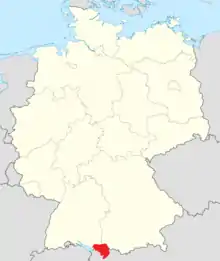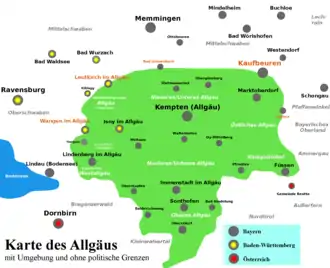Allgäu
The Allgäu (Standard German: [ˈalɡɔʏ̯], also Allgovia) is a region in Swabia in southern Germany. It covers the south of Bavarian Swabia, southeastern Baden-Württemberg and parts of Austria. The region stretches from the prealpine lands up to the Alps. The main rivers flowing through the Allgäu are the Lech and Iller. Allgäu is not an administrative unit.


Grey: cities in Bavaria; red: cities in Austria; yellow: cities in Baden-Württemberg
The alpine regions of the Allgäu rise over 2,000 metres in altitude and are popular for winter skiing. The Allgovian area is notable for its beautiful landscapes and is popular for vacations and therapeutic stays.[1] It is well known in Germany for its farm produce, especially dairy products including Hirtenkäse ("herdsman's cheese") and Bergkäse ("mountain cheese").
Besides tourism and dairy products, another important economic sector is the building of industrial equipment and machines. Fendt tractors, developed and produced in Marktoberdorf are one of the most famous products of the region. The castle of Neuschwanstein in Hohenschwangau is in the eastern part of the Allgäu.
The Allgäu is dominated in the south by the Allgäu Alps, which are not part of the Allgäu themselves. The Allgäu is formed mainly by glaciers and glacial debris. Many hills and lakes are remnants of former glaciers.
Gallery

 Allgäu as seen from a hot air balloon
Allgäu as seen from a hot air balloon
Notable people
- Michael Bredl (1916–1999), a singer and collector of traditional German Volksmusik
- Rainer W. Bussmann (born 1967), ethnobotanist and vegetation ecologist
References
- Its scenic countryside can be seen in Asmus, C. and Bufe, S. "Dampflokomotiven im Allgau" (1977, Hermann Merker).
External links
- Official tourist information (in German)
- Non-commercial Allgäu Information (in German)
- Alpine Club Oy/Allgäu (in German)
- Recipes from Allgäu (in German)